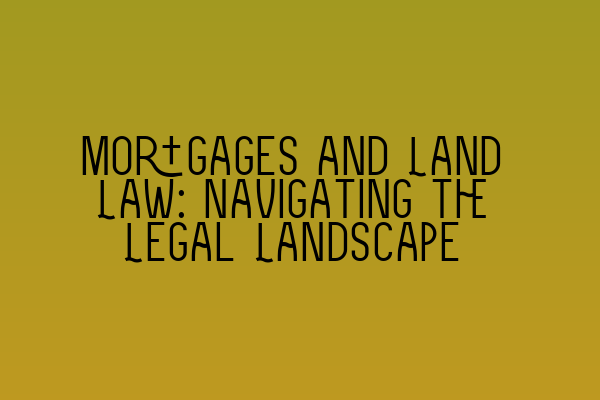Mortgages and Land Law: Navigating the Legal Landscape
When it comes to property ownership and financing, understanding the intricacies of mortgages and land law is crucial. From the legal requirements of entering into a mortgage to the rights and obligations of both the borrower and lender, having a grasp of the legal landscape can help protect your interests and ensure a smooth property transaction.
In this blog post, we will delve into the world of mortgages and land law, exploring key concepts, legal considerations, and best practices. Whether you are a prospective homeowner, a property investor, or a legal professional seeking to expand your knowledge, this comprehensive guide will provide you with valuable insights. So, let’s begin!
The Basics of Mortgages
Before we dive into the legal aspects of mortgages, let’s establish a clear understanding of what a mortgage actually is. Simply put, a mortgage is a legal agreement between a borrower and a lender that enables the borrower to obtain financing for the purchase of a property. The property itself serves as collateral for the loan, providing security for the lender in the event of default.
When entering into a mortgage, the borrower agrees to make regular payments, typically on a monthly basis, to repay the loan over a specified period of time. These payments consist of both principal (the original loan amount) and interest (the cost of borrowing).
The Legal Framework: Land Law and Mortgages
Mortgages are governed by land law, a branch of law that deals specifically with the rights and interests associated with land or real estate. The legal framework surrounding mortgages aims to strike a balance between protecting the interests of the parties involved and facilitating efficient property transactions.
In the United Kingdom, land law is primarily derived from common law principles and statutes, with the Land Registration Act 2002 being a key legislation in this area. Additionally, landmark cases and influential judicial decisions have shaped the application and interpretation of land law. For a thorough analysis of these cases, refer to our article on SQE Contract Law: Analyzing Landmark Cases and Influential Judicial Decisions.
When it comes to mortgages, there are several legal considerations to keep in mind:
Mortgage Deeds and Documentation
The mortgage itself is evidenced by a written agreement known as a mortgage deed. This document outlines the terms and conditions of the loan, including the interest rate, repayment schedule, and any specific provisions agreed upon by the parties involved. It is essential that the mortgage deed is properly executed and registered to ensure its validity and enforceability.
Rights and Obligations of the Borrower
As the borrower, you have certain rights and obligations under the mortgage agreement. These include the right to occupy and use the property, the obligation to make timely repayments, and the responsibility to maintain the property in good condition. Familiarize yourself with your rights and obligations by consulting our article on Understanding Contractual Capacity: Rights and Limitations.
Rights and Obligations of the Lender
The lender, on the other hand, also has rights and obligations under the mortgage agreement. These often include the right to repossess the property in case of default, the obligation to provide accurate and transparent loan information, and the responsibility to act in good faith throughout the lending process.
Foreclosure and Repossession
In the unfortunate event of default, the lender may initiate foreclosure proceedings to recover the outstanding debt. Foreclosure involves the legal process of repossessing the property and selling it to satisfy the debt. Properly understanding the foreclosure process is crucial to protect your interests as a borrower.
Ensuring Compliance: Legal Advice and Professional Assistance
Given the legal complexity surrounding mortgages and land law, it is highly advisable to seek legal advice and assistance throughout the process. Consulting a qualified solicitor with expertise in property law can ensure that you are fully aware of your rights and obligations, as well as help you navigate any potential legal pitfalls that may arise.
At SQE Property Law & Land Law, our team of experienced solicitors specialize in all aspects of property law, including mortgages. We offer expert guidance and comprehensive legal services tailored to your specific needs. Contact us today to schedule a consultation and ensure a smooth and legally compliant property transaction.
For further resources and insights into contract law, visit our related articles:
- Interactive SQE Mock Tests for Contract Law: Test Your Knowledge
- Join Our SQE Contract Law Webinars: Expert Insights and Guidance
- SQE Prep: Mastering the Essentials of Contract Law
We hope this blog post has shed light on the legal landscape surrounding mortgages and land law. By understanding the basics and seeking professional assistance, you can navigate the complexities and ensure a successful property transaction.
